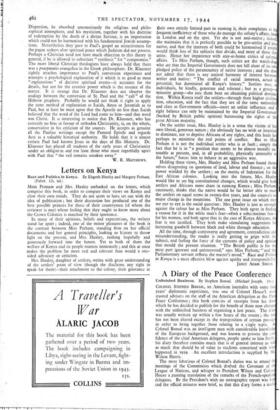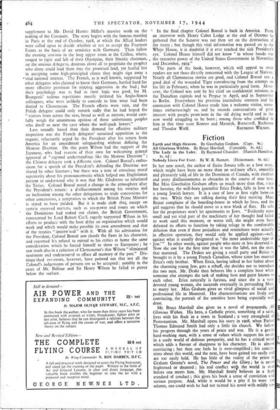A Diary of the Peace Conference
Unfinished Business. By Stephen Bonsai. (Michael Joseph. 18s.)
COLONEL STEPHEN BONSAL, an American journalist with some fo years' diplomatic experience, was one of Colonel Housei inn trusted adviser3 on the staff of the American delegation at the Pan Peace Conference ; this book consists of excerpts from his dia which he has decided to publish for the benefit of those now char; with the unfinished business of organising a just peace. The &a was usually written up within a few hours of the- events ; the tex has not been altered except in the transposition of certain passag. in order to bring together those relating to a sngle topic. A Colonel Bonsai was an intelligent man with considerable knowledg of the European background, and was known to possess the c3:1 fidence of the chief American delegates, people spoke to him freely his diary therefore contains much that is of general interest as we as much that should be of value to students concerned with wha happened in 1919. . An excellent introduction is supplied by Mr Wilson Harris.
The most laborious of Colonel Bonsai's duties was to attend th meetings of the Commission which drafted the Covenant of th League of Nations, and whisper to President Wilson and Colon House a running translation of the remarks of the French-speak' delegates. By the President's wish no stenographic report was k and the official minutes were brief, so that this diary forms a usef supplement to Mr. David Hunter Miller's massive work on the making of the Covenant. The story begins with the famous meeting in Paris at the end of October, 1918, at which the Allied leaders were called upon to decide whether or not to accept the Fourteen Points as the basis of an armistice with Germany. Then follow the evening sessions in the long upper room at the Crillon, where, ranged to right and left of their Olympian, their Sinaitic chairman, sat the anxious delegates, desirous above all to propitiate the prophet who alone could lead them into the promised land, yet fearful lest in accepting some high-principled clause they might sign away a vital national interest. The French, as is well known, supported by other delegates who claimed to know their Germans, battled hard for more effective provision for nipping aggression in the bud ; but their psychology was as bad as their logic was good, for M. Bourgeois' tedious repetitions merely irritated his Anglo-Saxon colleagues, who were unlikely to concede to him what had been denied to Clemenceau. The French efforts were vain, and the Polish delegate could only remark sadly that he had hoped the " visitors from across the seas, broad as well as narrow, would care- fully weigh the unanimous opinion of those unfortunate peoples who dwell so near the cave where the wolf-pack lowers."
Less soundly based than their demand for effective military inspection was the French delegates' sustained opposition to the request, reluctantly urged by the President after his return from America for an amendment safeguarding without defining the Monroe Doctrine. On this point Wilson had the support of the Japanese, who had reasons of their own for welcqming general approval of " regional understandings like the Monroe Doctrine " ; the Chinese delegate took a different view. Colonel Bonsai's enthu- siasm for a speech of the President's defending the Doctrine was shared by other listeners ; but there was a note of conscious moral superiority about his pronouncements which helped one Englishman present to understand why it was that Mr. Gladstone so infuriated the Tories. Colonel Bonsai noted a change in the atmosphere after the President's return : a disillusionment among his votaries and an inclination among the other delegations to trade concessions for other concessions, a temptation to which the British Prime Minister is stated to have yielded. But it is made clefr that, except on certain reserved matters, such as sea-power and issues on which the Dominions had staked out claims, the British Government, represented by Lord Robert Cecil, eagerly supported Wilson in his efforts ,to produce with the least delay an organisation which would work and which would make possible its own amendment and that of the treaties " intertwined " with it. With all his admiration for the President, Colonel Bonsai saw clearly the flaws in his character, and regretted his refusal to extend to his critics at home the same consideration which he forced himself to show to Europeans ; he saw truth also in a criticism of Clemenceau's that Wilson " eliminated sentiment and endeavoured to efface all memory of the past." Dis- tinguished reviewers, however, have pointed out that not all the Colonel's judgements of persons are to be accepted : notably in the cases of Mr. Balfour and Sir Henry Wilson he failed to pierce below the surface.
In the final chapter Colonel Bonsai is back in America. From an interview with Henry Cabot Lodge at the end of October he gathered that the Senator was not then set on the destruction of the treaty ; but though this vital information was passed on to the White House, it is doubtful if it ever reached the sick President's eye. Colonel House himself did not know " in whose hands was the executive power of the United States Government in November and December, 1919."
The parts of the book, however, which will appeal to most readers are not those directly concerned with the League of Nations. Nearly all Clemenceau stories are good, and Colonel Bonsai saw a good deal of the wounded Tiger convalescing from the attempt on his life in February, when he was in particularly good form. More- over the Colonel was sent by his chief on confidential missions to the Danubian capitals and to Prague in April, and in September to Berlin. Everywhere his previous journalistic contacts and his connexion with Colonel House made him a welcome visitor, some- times embarrassingly so, and he records conversations of great interest with people prominent in the old dying world and in the new world struggling to be born ; among those who confided in him at this time were Renner and Masaryk, Bernstorff, Rathenau



























 Previous page
Previous page